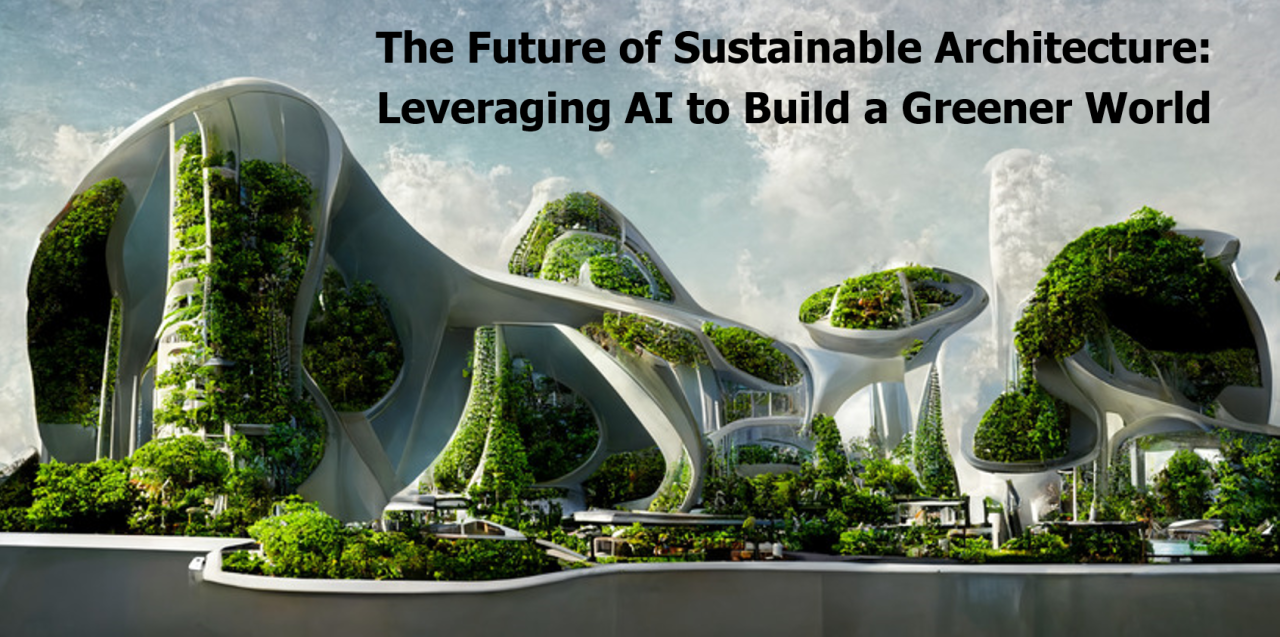
"The Future of Sustainable Architecture: Leveraging AI to Build a Greener World"
Architectural design has a significant impact on the environment and human well-being. The buildings we inhabit consume resources, generate waste, and affect the quality of our lives. Therefore, designing buildings that are sustainable and environmentally responsible is crucial to achieving the Sustainable Development Goals (SDGs).
In recent years, artificial intelligence (AI) has emerged as a promising tool for architectural design. AI algorithms can analyze vast amounts of data on building performance, climate conditions, and user behaviour to optimize building systems for energy efficiency, water conservation, waste reduction, and other sustainability objectives. In this article, we will explore how AI can help achieve the SDGs through architectural design.
Energy Efficiency
Buildings consume a significant amount of energy, and their energy usage contributes to greenhouse gas emissions, climate change, and air pollution. Therefore, designing energy-efficient buildings is essential to achieving SDG 7 (Affordable and Clean Energy) and SDG 13 (Climate Action).
AI can help architects and engineers design buildings that consume less energy and operate more efficiently. By analyzing data on energy consumption patterns, weather conditions, and occupant behaviour, AI algorithms can optimize building systems, such as heating/cooling, ventilation, and lighting, to reduce energy waste. For example, AI can adjust the temperature and lighting levels based on occupancy and time of day, or predict energy demand based on weather forecasts, and adjust building systems accordingly.
Water Conservation
Water scarcity and water pollution are significant global challenges that affect human health, agriculture, and ecosystems. Therefore, designing buildings that conserve water is crucial to achieving SDG 6 (Clean Water and Sanitation).
AI can help architects and engineers design buildings that reduce water consumption and waste. By analyzing data on water usage patterns, climate conditions, and building systems, AI algorithms can optimize water management strategies, such as rainwater harvesting, greywater recycling, and low-flow fixtures. For example, AI can predict water demand based on occupancy and weather conditions and adjust water supply accordingly or monitor water usage in real-time and alert occupants of excessive use.
Waste Reduction
The production and disposal of waste have significant environmental and social impacts, from resource depletion to pollution and health hazards. Therefore, designing buildings that reduce waste and promote recycling is essential to achieving SDG 12 (Responsible Consumption and Production).
AI can help architects and engineers design buildings that minimize waste production and maximize recycling. By analyzing data on waste generation, disposal, and recycling rates, AI algorithms can optimize building systems, such as waste management, material selection, and product design, to reduce waste and promote circularity. For example, AI can recommend sustainable materials based on their environmental impact, predict waste generation based on occupancy and activities, or suggest recycling strategies based on waste composition and availability.
Green Space
Green space, such as parks, gardens, and green roofs, has numerous environmental, social, and health benefits, such as reducing urban heat island effects, improving air quality, and promoting well-being. Therefore, designing buildings that incorporate green space is crucial to achieving SDG 15 (Life on Land).
AI can help architects and engineers design buildings that maximize green space and optimize its benefits. By analyzing data on climate conditions, building design, and user behaviour, AI algorithms can optimize building systems, such as landscaping, green roofs, and vertical gardens, to increase the amount and quality of green space. For example, AI can recommend plant species based on their adaptability and ecosystem services, predict green space maintenance based on weather and occupancy, or simulate the effects of green space on indoor air quality and user satisfaction.
Accessibility
Accessibility is an essential aspect of sustainable development, as it promotes social inclusion, equity, and dignity. Therefore, designing buildings that are accessible to all, including people with disabilities, is crucial to achieving SDGs.
In conclusion, architectural design using AI can play a significant role in achieving the Sustainable Development Goals by optimizing building systems for energy efficiency, water conservation, waste reduction, green space, and accessibility. AI algorithms can help architects and engineers analyze complex data and optimize building systems for multiple sustainability objectives, leading to better environmental and social outcomes. However, AI is not a panacea, and it requires critical thinking, ethical considerations, and human expertise to ensure that it serves the best interests of the environment and society. Therefore, architects and engineers should embrace AI as a tool for sustainable design and integrate it with their professional judgment and creativity to achieve the SDGs effectively.
#sustainability #architecture #AI #SDGs #energyefficiency #waterconservation #wastereduction #greenspace #accessibility #climateaction #responsibleconsumption #cleanwater #lifelonland #cleanenergy #artificialintelligence #greendesign #innovation #futureofarchitecture #construction #engineering #smartbuildings #digitaltransformation NEOM TONOMUS CONIX.AI
Founder @Loftrek: Ethical AI Driven Distribution Company | Board Member @Romanian United Foundation | Founder @Hotel Marketing Solutions | Core values: Integrity, Growth, Innovation, Relationships, Impact, Efficiency
1moHani Farrag having visited Expo2020Fans from Dubai, the sustainability section I find this subject fascinating.
Karim Helal